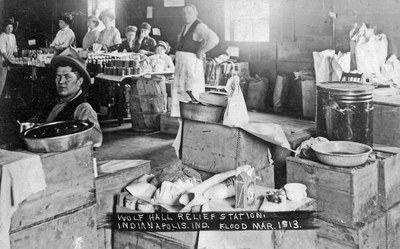
Plan your visit
Thinking About Our Relationship with Water
October 2, 2012

Next spring, the Indiana Historical Society will be one
of many organizations commemorating the Great Flood of 1913? that affected
cities and towns throughout the Midwest and the Ohio River Valley. Over the
Easter holiday weekend in 1913, the area received between six and 12 inches
of rainfall over a five-day period that added to an already saturated ground
and filled rivers to the brim. As the levees broke, flood waters gushed into Indianapolis
neighborhoods and buildings, killing 11, and affecting thousands.
As we uncover the complexity of this story, we are
thrilled to work with members of the National Oceanic and Atmospheric
Administration, as well as historians and specialists in the field of
environmental and urban history. We are guided by Dr. Phil Scarpino of IUPUI to make sure that our
visitors do not leave the exhibit thinking that rain alone is what causes a
flood, rather, that floods are the result of human choices and decisions to
interact in particular ways with their environment. In Indianapolis, early
settlers focused on making the landscape fit the needs of business and
settlement, and in the process took away the ability of natural resources to do
their jobs. By cutting down trees along the river and throughout towns, the
settlers took away the land?s ability to absorb rainwater. People built homes,
businesses and farms upon what had historically been a floodplain.
In addition, the 1913 floodwaters were filled with sewage and waste from surrounding areas. On the cusp of major
breakthroughs in germ theory, and on the eve of a public health crisis that
would ultimately lead to drastic improvements, those unfortunate to find
themselves in the flood?s path were buried in water that would horrify those
concerned with water cleanliness today.
Visitors to the Indiana Historical Society?s ninth You
Are There experience will enter Wulf?s Hall Relief station on Monday, March 31,
1913, set up to help flood sufferers on the west side of downtown six days
after the White River levee failed. They will hear the tales of the flood?s
impact and help assemble supplies for those in need. It will be nearly
impossible to go through this experience without thinking about the floods that
continue to make headlines today and to wish that we could somehow find a way
to prevent them. There are important lessons to be learned from the causes of
1913?s massive flood that might help shape discourse about land use and flood
prevention today. We hope that you will visit us when this experience opens on
March 26, 1913, and help us bring the past to life.
Also, IHS is one of the finalists in the IPL Golden Eagle
Environmental Grants? campaign on WIBC 93.1. We have already earned a $1,000
grant from IPL to help us develop You Are There 1913: A City Under Water, which
addresses the environmental effects of local flooding. Please vote for us today
at www.wibc.com/IPLGoldenEagle and we could win $10,000 for this important project.
_______________________________








